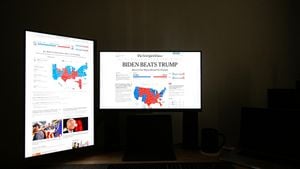China's push to tighten regulations on its semiconductor industry has raised alarm bells across the globe, particularly affecting Japanese electronic manufacturers. Key players such as Tokyo Electron and Advantest have reported significant stock declines as the effects of U.S. regulatory measures against China ripple throughout Asia.
On February 25, 2023, stock values for major electronics firms experienced deep drops, with Tokyo Electron facing losses of up to 4.4%, marking the steepest decline since February 7. Reports from Bloomberg outlined the U.S. government's insistence on imposing stricter regulations on China's semiconductor operations, creating pressures on key allies like Japan to align with these measures.
Other companies also felt the sting. Advantest's shares fell by around 5.9%, and Disco dropped 7.3%. LaserTech and SCREEN Holdings also faced declines of 3.6% and 4.4%, respectively, indicating widespread investor concern about the future of the semiconductor market.
Market analysts suggest these moves were anticipated as companies had already seen dwindling stock values due to reduced investment opportunities linked to artificial intelligence (AI) as reported by Microsoft. Andrew Jackson, who heads Japanese stock strategy at Altus Advisors, noted, “The increased scrutiny is somewhat expected; the semiconductor-related stocks were already falling amid concerns from Microsoft about scaling back AI investments.”
The U.S. has taken these measures to counteract China's growing dominance in semiconductor manufacturing, which is seen as strategically important for technological advancement and national security. Japan's response to this pressure will have broader consequences, particularly as it grapples with its own challenges of technological innovation and economic sustainability.
China's semiconductor crackdown is not merely affecting individual stocks but is reshaping the entire electronic architecture of the region. The ramifications of this regulatory shift are expected to be substantial, influencing not just stock prices but strategic alliances within the technology sector.
Investors are watching closely as Japan navigates these challenges. The potential for increased regulation from both the U.S. and Chinese governments could lead to shifts in supply chain collaborations, pushing Japanese manufacturers to adapt rapidly to maintain their market position.
Japan has traditionally been seen as a cornerstone of the global semiconductor supply chain, and this vulnerability to changing regulatory landscapes could represent significant turmoil. The real impact of these developments may yet unravel as market actors respond to the political dynamics.
For now, Japanese companies must reckon with the prospect of reduced revenues and tighter operational conditions as they adjust to new regulations on both sides of the Pacific. The situation remains fluid, and the outcome will depend on how effectively Japan can align with U.S. policies without sacrificing its economic interests.
Such precarious conditions compel key industry players to reassess their strategies to maintain competitiveness. The future of Japan's semiconductor industry hangs delicately on this balance between cooperation and compliance amid geopolitical pressures.



